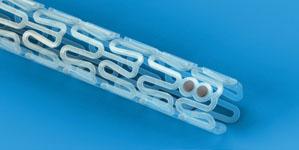
Abbott's BVS bioabsorbable stent.
November 17, 2009 – Following positive three-year data from the first 30 patients treated with a fully bioabsorbable drug-eluting coronary stent, Abbott is initiating a large-scale trial with about 1,000 patients from up to 100 centers in Europe, Asia Pacific, Canada and Latin America.
The ABSORB trial demonstrate the stent successfully treated coronary artery disease and was absorbed into the walls of treated arteries. Patients in this first phase of the trial experienced no stent thrombosis out to three years, and no new major adverse cardiac events (MACE) between six months and three years (3.6 percent at three years). These results were presented Monday at the 2009 American Heart Association’s Scientific Sessions in Orlando.
Abbott also said yesterday it will soon begin the ABSORB EXTEND trial, a single-arm study designed to further evaluate the performance of Abbott’s fully bioabsorbable stent technology. The study will enroll patients with more complex coronary artery disease and is slated to begin enrolling before the end of the year.
“Abbott’s bioabsorbable stent has the potential to be a major breakthrough for coronary artery disease patients. The data show that patients continue to do well three years after treatment with the bioabsorbable coronary stent,” said Patrick W. Serruys, M.D., Ph.D., professor of interventional cardiology at the Thoraxcentre, Erasmus University Hospital, Rotterdam, the Netherlands, and principal investigator for the ABSORB trial. “The strong results confirm my belief that bioabsorbable technology is the next revolution in interventional cardiology.”
The company also announced patient enrollment is complete for the second phase of the ABSORB trial. The second phase enrolled 101 additional patients from 12 centers in Europe, Australia and New Zealand, and incorporated device enhancements designed to improve deliverability and vessel support.
The bioabsorbable everolimus-eluting coronary scaffold is made of polylactide, a biocompatible material commonly used in medical implants such as absorbable sutures. Unlike a metallic stent, the scaffold is designed to be slowly metabolized by the body and is completely absorbed over time.
For more information: www.abbott.com


 January 05, 2026
January 05, 2026 









